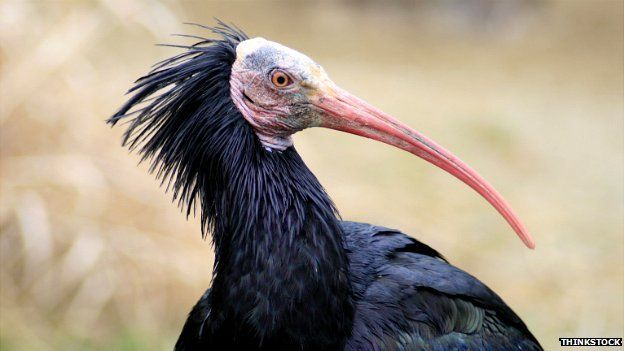IS threat to Syria's northern bald ibis near Palmyra
- Published

A rare bird may become extinct in Syria because of the capture of Palmyra by Islamic State, experts say.
A tiny breeding colony of the northern bald ibis - a critically endangered species - was found near the city in 2002.
Only one female returned from the wintering grounds in spring 2013.
Three further birds held in captivity were abandoned last week after their Bedouin guards fled the fighting. Their fate is unknown.
'Extinction'
The Society for the Protection of Nature in Lebanon has offered a reward of $1,000 (£646) for information on the whereabouts of Zenobia (named after the queen of Palmyra), the only remaining bird who knows the migration routes to wintering grounds in Ethiopia.
Without her, birds bred in captivity cannot learn the migration routes and the species could go extinct in the wild in Syria, say ornithologists.
"Culture and nature, they go hand in hand, and war stops, but nobody can bring back a species from extinction," Asaad Serhal, Head of the Society for the Protection of Nature in Lebanon, told the BBC.
The BBC's Jim Muir in Beirut says that for several decades the species was thought to be extinct in the Middle East until seven birds were found nesting near Palmyra more than 10 years ago.
Despite being protected, and breeding, their numbers dwindled to just four wild birds by 2012.
A tagging project in 2006 discovered that the birds from the Syrian colony were wintering in Ethiopia. But it was unclear what was happening to the fledgling or immature birds.
In a previous study of the same birds, Dr Steven Portugal and his colleagues revealed why birds fly in a V formation. Footage courtesy of Waldarappteam.
Background: Dr Steve Portugal, Royal Holloway University of London
Bald ibis were originally widespread across Europe, Africa and the Middle East, but due to hunting, habitat loss and pesticide poisoning, they underwent dramatic population declines and are now only found in Morocco and Syria.
These two populations are incredibly small, with the Moroccan population being unusual for the species in that they are not migratory, spending all year at the same site in the Atlas Mountains.
Most historic populations were highly migratory, and the relic Syrian population contains the only remaining individuals who have the knowledge of historic migration routes from Syria to wintering grounds in Ethiopia.
The loss of this remnant population would result in the loss of the last migratory bald ibis, while also losing the genetic diversity that these migratory individuals contain.
The fall of Palmyra came just days after IS captured the major Iraqi city of Ramadi.
The capture of the ancient ruins at the World Heritage site next to the modern city of Palmyra has raised international alarm.
IS militants have destroyed several sites in Iraq - most recently the ancient city of Nimrud, one of Iraq's greatest archaeological treasures.